
- #FENG SHUI ROOM PLANNER HOW TO#
- #FENG SHUI ROOM PLANNER PROFESSIONAL#
- #FENG SHUI ROOM PLANNER WINDOWS#
They're the spot we go to eliminate waste and are often seen or referred to as an energy drain to space due to their purpose. Bathroomsīathrooms are often looked at as evil in feng shui. They also can purify the air, reduce stress, and promote relaxation. Plants are believed to hold in Qi or energy, which helps your home gather and retain energy for your well-being. Adding indoor plants to a space is a popular and effective way to improve feng shui. (Image credit: help hold in the Qi (energy). Also, pay attention to whether you like it brighter or dimmer, your lighting should match your preferences. Natural lighting can be controlled with room darkening curtains or blinds, which can also help block out light pollution from close neighbors as well as early sunrises to allow for a better night's sleep.
#FENG SHUI ROOM PLANNER WINDOWS#
This can be achieved by using dimmer switches, adjustable lamps, and natural light sources such as windows and skylights. Studies show this can help with mental health and overall well-being.Īlthough natural sunlight is important in a home, too much light can be overwhelming so controlling both artificial and natural lighting is important. Opening curtains and blinds to allow a daily dose of sunlight plays an important role in our lives. Sunlight is also an important aspect of feng shui, as it can play an important role in how your space feels. For an added feng shui-inspired design touch, you can add a wreath, door hanger, or plants around the area to make it more welcoming. The International Feng Shui Guild provides a directory, so you can find a consultant in your area.Getting this energy into your home is easy to obtain by simply keeping the front door in good repair and the surrounding area clean and clutter-free, as this will assist with ensuring positive energy flow into the home.Ī well-maintained front door also creates a welcoming and inviting atmosphere, both for the occupants of the home and for visitors.
#FENG SHUI ROOM PLANNER PROFESSIONAL#
Hire an expertĪ professional consultant can help you organize and decorate your office according to the feng shui principles and elements. If you must use artificial light, opt for incandescent, full-spectrum light bulbs.

Yellow-tinted and fluorescent lighting can bring about fatigue. When possible, use natural light from windows. Choose the right colorsįeng shui office colors should create balance without being overwhelming. Surround your office with images and objects that are inspiring, such as pictures with mottos or images that symbolize what you want to accomplish. A live plant can also help improve indoor air quality. Try placing a fountain with moving water in your office. Introduce water and plant elementsĮxperts believe incorporating water features and plants into your workspace can creative positive energy. It’s believed that a high back creates support and protection. Choose the right chairĪ comfortable chair with a high backing is ideal for feng shui. If this isn’t possible, try placing a row of lush plants behind your seating area. You can produce strong feng shui backing by positioning your chair so your back is against a solid wall.

Arrange your desk so that you can see the door when seated. Place your desk in the power positionĪccording to feng shui, you should place your desk so that you are sitting in the “power position.” This is the furthest spot from the entrance of the room.
#FENG SHUI ROOM PLANNER HOW TO#
Read on to learn how to arrange your office according to feng shui.įrom incorporating specific colors to placing your furniture in the proper spot, there are many ways to bring feng shui to your office. dollars) on feng shui consultations, designs, and construction fees. In a dated survey, 70 percent of Taiwanese businesses valued feng shui, and each company in the survey spent an average of $27,000 (U.S. Many Asian businesspeople go to great lengths to incorporate feng shui into their corporate environment. In recent years, the feng shui philosophy has become increasingly popular in Western countries as well. The practice originated in China more than 3,000 years ago and has been embraced in Asian-Pacific places like Japan, Korea, Singapore, Philippines, Vietnam, Thailand, and Malaysia. The concept also involves using colors, materials, and the layout of a space to create a favorable ambiance.

With feng shui, objects in a room are arranged according to the flow of natural energy. It literally means “wind” (feng) and “water” (shui). Feng shui is an ancient Chinese art that involves creating a space that’s harmonious with the environment.


 0 kommentar(er)
0 kommentar(er)
